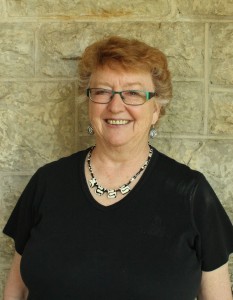CSOP Participant Profile – Beverley Stewart

By Ellen Paulley
Beverely Stewart has explored her longstanding interest in peace and justice by taking courses at the Canadian School of Peacebuilding over the last few years.
This year she participated in Women and Peacebuilding, taught by Ouyporn Khuankaew and Ginger Norwood.
“I’ve always liked the idea that this [CSOP] is called peacebuilding,” says Stewart. “The focus of this course has been on ourselves and our own personal being. How do we build peace? How do we become a person of peace within our inner being?”
Instructors Khuankaew and Norwood drew on their Engaged Buddhist roots and their work in Burma, India, Sri Lanka, and Thailand to work with participants to analyze women’s involvement in peace action, research, and education. The course also looked at the challenges that women activists face, such as building common ground among women with varied experiences and concerns.
In the past, Stewart has taken Exploring Indigenous Justice and Healing and Human Rights and Indigenous Legal Traditions. After each course, she shares her learning to some extent with family, friends, and colleagues.
“Each year that I’ve come, I’ve been able to move on and listen and learn in a different way than before the course,” she says. “As the story goes, peacebuilding begins with you.”
A retired Anglican priest, Stewart sees a strong connection between faith and social justice.
“It [social justice] is the faith,” she says. “Faith is all about reconciliation and peace and justice. Those two go together.”
Through her work and now in retirement, Stewart has had opportunities to travel in Central Asia, Africa, Iran, and North Korea, on pilgrimages, classes, and tours. As such, she’s been exposed to a diversity of religions, cultures, and governance models.
“Every [trip] is a piece of the puzzle, and it’s all a part of the web. Each one teaches me something different.”
Stewart is grateful for the opportunities she’s had, which have led her to wonder about the options available to affect positive change in the world.
“How much right do we as a nation, a community, a religious institution—any kind of a we or an I—have to tell somebody else what to do, how to believe and behave?”
While peacebuilding and working for change can feel overwhelming at times, Stewart stresses the importance of drawing on faith to stay motivated.
“Peace groups that haven’t had an element of faith haven’t lasted,” she says. “There’s something about the ground work of an element of faith—whatever that faith might mean to that person. It’s like a tree, you have to have that rootedness in order to survive.”
For those interested in attending CSOP, Stewart encourages them to come. “Having international and interfaith communities is one of the absolute blessings of this place,” she says.







